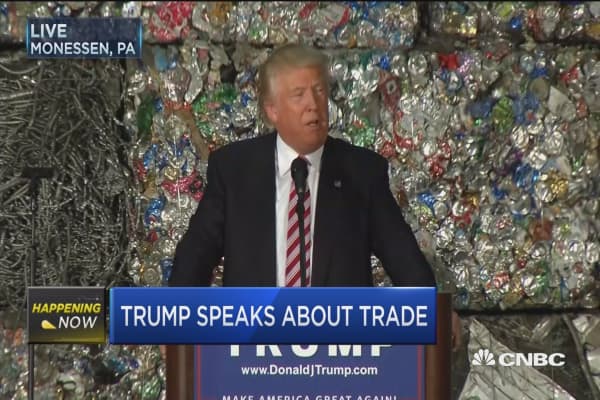
The advent of Trump is changing attitudes and the equilibrium. Obama’s successor considers China a lot more dangerous than Russia for America’s future and risks leaving too much space to Beijing on trade and international policy, thus allowing Xi Jinping to present himself as the new champion of free trade. Meanwhile, General Motors is under fire due to the Chevrolet Cruze being produced in Mexico. Japan’s Toyota, which for 30 years has built factories in the United States, has been threatened with seeing its cars burdened with heavy customs duties because now it wants to build one in Mexico. Ford and Carrier (United Technologies) have gained approval from the new American president as, yielding to his pressure, they have agreed to scale back or cancel their investment plans in Mexico. Then there are the attacks on the aerospace giants Boeing and Lockheed, which are accused of selling products too expensive for the federal administration (the new Air Force One and the F-35 fighter jets).
The strange “anti-globalization” which is about to take office at the White House horrifies purists of liberalism, especially conservative ones; for his interventionism in the economy which sometimes seems a foreshadowing of dirigisme,* and his furious pick-axing of the treaties which govern international trade: the rules upon which is built the globalization that has been the entire world economy’s frame of reference for at least 30 years. Certainly since the fall of the Berlin Wall, with the end of the Soviet bloc, and the Chinese economic reform by Deng Xiaoping. Anti-capitalist guerrillas, who since the 1999 Seattle revolt have disputed every international economic summit, would never have thought that the most effective leader of the “anti-globalization” battle would not be one of their own, but a billionaire Scrooge who made his money selling luxury houses to people who got rich directly thanks to globalization. Donald Trump is truly the surprising demolisher of the dominant economic model of the last third of a century. And what will he take action against?
Here, opinions differ: on the one hand, the horror of the economists that some of the catastrophic consequences of the new president’s ideas, denouncing the rules of “free trade,” will cause a slowdown in trade, will turn off the engines of development and will sow distrust in the markets. On the other hand, the substantial optimism of the financial markets is expecting a strong impulse toward growth, at least in the short term: Development will be stimulated by the promise of “deregulation,” from new tax cuts and increased spending on public investment, as well as by Trump’s will to strengthen the U.S. economy at the expense of all others, even at the cost of resorting to instruments of protectionism.
Does it really just take one Trump to make what until yesterday was considered an unavoidable template, even by those who criticized the logic of the neo-liberal “single thought,” vanish into thin air? It is permissible to doubt this for several reasons: First, because the new populist president is making apparently contradictory choices, filling his government with “marketists”: billionaires, financiers and those bankers who until yesterday he said he loathed. And then, because a president “deal maker” at ease in business negotiations, much more than in the intricacies of the legislative process, might settle for a series of symbolic victories on the repatriation of factories which reinforce his image in front of the electorate (even if what is destroying jobs in the U.S. is more automation rather than the transfer of the factories abroad), and setting aside or slowing the complicated game of the revision of treaties, which requires the commitment of Congress and a willingness of international counterparts. Agreements such as NAFTA, which binds the U.S. to Mexico and Canada, are difficult to disassemble even for economic realities now well-established: Most of the vehicles produced in the United States today are made up of components produced in Mexico; by imposing customs duties, Trump would inevitably punish “Made in the USA” also.
Mark Zuckerberg of Facebook, who, according to some, is studying to be the “anti-Trump,” will begin his “long march” with a road trip across America aiming to discover what went wrong with globalization: something unthinkable only a few months ago. And while the U.S. slides toward protectionism, if not toward forms of isolationism, the China of Xi Jinping rises, with its president going in person to the Davos Economic Forum in a few days’ time, trying to become the embodiment of that “Davos man” which thus far has been dressed in stars and stripes, but is now an outcast in the universe of the new president.
Most likely, the entrepreneur, who brings to the White House his tendency to challenge contestants risking everything, thinks that closing the doors of the U.S. market, the largest in the world, to China will substantially weaken Beijing, forcing Xi Jinping to back down. A scheme that might work in the comparing of “monocratic” companies, but is harder to apply in the complex dynamics of relations between superpowers. Just think of the sanctions against Russia for Ukraine. According to Obama, they should have weakened Putin, and instead they have strengthened him, in addition to feeding Russian nationalism and anti-Western sentiment.
*Editor’s note: Dirigisme refers to a capitalist economy in which the state plays a strong directive role, as opposed to a merely regulatory one.

Leave a Reply
You must be logged in to post a comment.